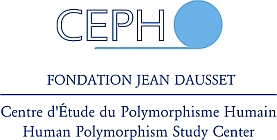Pr Jean Dausset, Prix Nobel de Médecine, 1980

Identification of innovative therapeutic targets using high-throughput RNA sequencing in MSI colorectal tumours
Principal investigator: Alex Duval, INSERM, UMRS 938, Hôpital Saint Antoine, Paris
Co-Principal investigators: Jean-François Deleuze and Habib Zouali, Fondation Jean Dausset - CEPH
Tumors that are deficient in the MMR (Mismatch Repair) system have an MSI phenotype (Microsatellite Instability) characterized by genetic instability of microsatellite DNA repeat sequences. Consequently, these tumours accumulate somatic mutations in coding microsatellite repeats located within different genes whose function have an important role in oncogenesis. In addition, MSI instability affects the non-coding repeats, especially the ones of acceptor splicing sites, which have a crucial role in recognition of intron-exon boundaries by the splicing machinery.
The work reported by Alex Duval's team, in collaboration with the Fondation Jean Dausset-CEPH, has recently led to the identification of a HSP110 mutant protein. The aberrant protein was generated from an abnormally spliced mRNA, due to somatic deletion in a microsatellite repeat in the intron 8-splicing acceptor site in the gene of that chaperone (T17 repeat) (Dorard et al., Nat. Med. 2011). Remarkably, the HSP110 mutation leads to the loss of function of the chaperone activity, inhibiting particularly the anti-apoptotic HSP110 function and its role in tumour cell resistance to drugs. As a result, the response of patients with MSI CRC (ColoRectal Cancer) to chemotherapy is better when HSP110 chaperone is mutated (Collura et al., Gastroenterology 2014).
In this context, a collaborative project, funded by "France Génomique", between Alex Duval's team, La Ligue contre le cancer, the Centre National de Génotypage-IG-CEA and the Fondation Jean Dausset-CEPH, was recently initiated. The aim is to identify other genes whose expression is abnormal or affected by common aberrant splicing leading to clinically relevant events in MSI CRCs. High-throughput sequencing of RNA (RNAseq) extracted from 150 MSI colorectal tumours and their paired adjacent normal mucosa, from Saint-Antoine hospital, is in progress. Fifty MSS colon tumours (non-MSI) and their paired adjacent normal mucosa and a similar set of 10 CRC cell lines (5 MSI, 5 MSS) are also analysed.
 |  |  |










